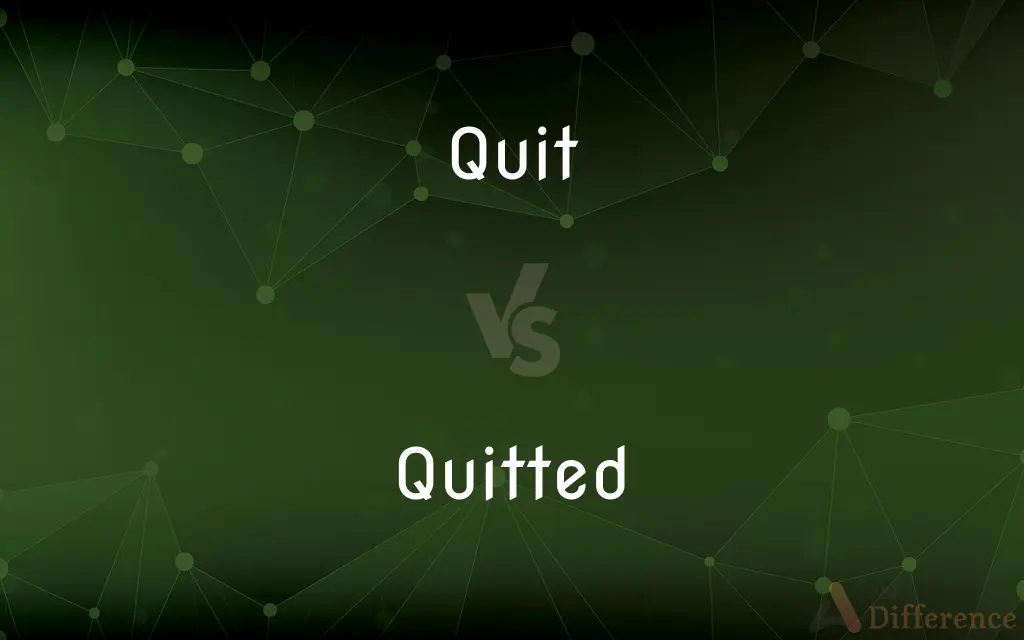Quit vs. Quitted — What's the Difference?
By Urooj Arif & Fiza Rafique — Updated on April 2, 2024
Quit is the most common form for leaving or stopping, whereas Quitted is an archaic, less used form.

Difference Between Quit and Quitted
Table of Contents
ADVERTISEMENT
Key Differences
Quit is commonly used in both American and British English to denote leaving a place or ceasing an action or habit. It is the standard past tense and past participle form in modern English, applicable in various contexts, such as quitting a job or quitting smoking. Quitted, on the other hand, is considered archaic and is rarely used in contemporary English. While historically accurate and found in older texts, its use today might be stylistic or to evoke an old-fashioned tone. Quitted follows the regular past tense and past participle formation but has largely been replaced by quit.
While "quit" seamlessly integrates into modern discourse, indicating a direct and contemporary approach to expressing cessation or departure, "quitted" carries a nuanced, historical flavor. This difference underscores the dynamic nature of language and how usage evolves over time to reflect common practices.
The evolution from "quitted" to "quit" as the preferred form mirrors broader linguistic trends toward simplification and efficiency in language use. This transition highlights how language adapts, favoring forms that are easier to use and remember in everyday communication.
In writing and speech, choosing between "quit" and "quitted" depends largely on the desired tone and context. Contemporary usage overwhelmingly prefers "quit" for its brevity and modernity, while "quitted" might be used for artistic or deliberate historical reference.
Comparison Chart
Usage
Common in modern English
Archaic and rarely used
ADVERTISEMENT
Context
Used in everyday and formal contexts
Used stylistically or in historical texts
Language Evolution
Represents current standard usage
Represents an older form
Tone
Direct and contemporary
Old-fashioned or stylistic
Linguistic Trend
Reflects trend towards simplification
Reflects historical language practices
Compare with Definitions
Quit
To leave (a place), usually permanently.
He quit the room quietly.
Quitted
To have given up or surrendered in the past.
They quitted the siege after a fortnight.
Quit
To stop or cease from doing something.
She quit smoking last year.
Quitted
Old-fashioned way to say resigned from a position.
He quitted his office with immediate effect.
Quit
To stop functioning or operating.
My computer quit on me overnight.
Quitted
Historical term for leaving a place.
He quitted the premises as ordered.
Quit
To resign from a job or position.
He quit his job to travel the world.
Quitted
Archaic form of ceasing an action.
She quitted her endeavors after many failures.
Quit
To give up or surrender.
They quit the competition after the preliminary round.
Quitted
Historical context for stopping functioning.
The old clock quitted at midnight.
Quit
To cease or discontinue
Asked them to quit talking.
Quit smoking.
Quitted
To cease or discontinue
Asked them to quit talking.
Quit smoking.
Quit
To resign from or relinquish
Quit a job.
Quitted
To resign from or relinquish
Quit a job.
Quit
To depart from; leave
"You and I are on the point of quitting the theater of our exploits" (Horatio Nelson).
Quitted
To depart from; leave
"You and I are on the point of quitting the theater of our exploits" (Horatio Nelson).
Quit
To leave the company of
Had to quit the gathering in order to be home by midnight.
Quitted
To leave the company of
Had to quit the gathering in order to be home by midnight.
Quit
(Computers) To exit (an application).
Quitted
(Computers) To exit (an application).
Quit
To rid oneself of by paying
Quit a debt.
Quitted
To rid oneself of by paying
Quit a debt.
Quit
To release from a burden or responsibility.
Quitted
To release from a burden or responsibility.
Quit
(Archaic) To conduct (oneself) in a specified way
Quit yourselves like adults.
Quitted
(Archaic) To conduct (oneself) in a specified way
Quit yourselves like adults.
Quit
To cease an action or cease working properly; stop
The car quit on the hill.
Quitted
To cease an action or cease working properly; stop
The car quit on the hill.
Quit
To abandon an activity out of frustration or despair; give up
Saw that he would never get the part and quit.
Quitted
To abandon an activity out of frustration or despair; give up
Saw that he would never get the part and quit.
Quit
To resign from or leave a job.
Quitted
To resign from or leave a job.
Quit
Absolved of a duty or an obligation; free.
Quitted
Absolved of a duty or an obligation; free.
Quit
(usually followed by of) Released from obligation, penalty, etc; free, clear, or rid.
Quitted
Simple past tense and past participle of quit
Quit
To pay (a debt, fine etc.).
Quit
To repay (someone) for (something).
Quit
To repay, pay back (a good deed, injury etc.).
Quit
To conduct or acquit (oneself); to behave (in a specified way).
Quit
To carry through; to go through to the end.
Quit
(transitive) To set at rest; to free, as from anything harmful or oppressive; to relieve; to clear; to liberate.
Quit
(transitive) To release from obligation, accusation, penalty, etc.; to absolve; to acquit.
Quit
(transitive) To abandon, renounce (a thing).
Quit
(transitive) To leave (a place).
Quit
To resign from (a job, office, position, etc.).
After having to work overtime without being paid, I quit my job.
Quit
To stop, give up (an activity) (usually + gerund or verbal noun).
John is planning to quit smoking.
Quit
To close (an application).
Quit
Any of numerous species of small passerine birds native to tropical America.
Quit
Any one of numerous species of small passerine birds native of tropical America. See Banana quit, under Banana, and Guitguit.
Quit
Released from obligation, charge, penalty, etc.; free; clear; absolved; acquitted.
The owner of the ox shall be quit.
Quit
To release from obligation, accusation, penalty, or the like; to absolve; to acquit.
There may no gold them quyte.
God will relent, and quit thee all his debt.
Quit
To discharge, as an obligation or duty; to meet and satisfy, as a claim or debt; to make payment for or of; to requite; to repay.
The blissful martyr quyte you your meed.
Enkindle all the sparks of natureTo quit this horrid act.
Before that judge that quits each soul his hire.
Quit
To meet the claims upon, or expectations entertained of; to conduct; to acquit; - used reflexively.
Be strong, and quit yourselves like men.
Samson hath quit himselfLike Samson.
Quit
To carry through; to go through to the end.
Never worthy prince a day did quitWith greater hazard and with more renown.
Quit
To have done with; to cease from; to stop; hence, to depart from; to leave; to forsake; as, to quit work; to quit the place; to quit jesting.
Such a superficial way of examining is to quit truth for appearance.
Does not the earth quit scores with all the elements in the noble fruits that issue from it?
Quit
To go away; to depart; to stop doing a thing; to cease.
Quit
Put an end to a state or an activity;
Quit teasing your little brother
Quit
Give up or retire from a position;
The Secretary fo the Navy will leave office next month
The chairman resigned over the financial scandal
Quit
Go away or leave
Quit
Turn away from; give up;
I am foreswearing women forever
Quit
Give up in the face of defeat of lacking hope; admit defeat;
In the second round, the challenger gave up
Common Curiosities
Why has "quit" become more popular than "quitted"?
Language simplification and the efficiency of communication have made "quit" more popular.
Do both "quit" and "quitted" follow the same grammatical rules?
While both serve as past tense and past participle forms, "quit" is now the standard in modern English.
Are there contexts where "quitted" is still preferred?
"Quitted" may be used for stylistic reasons or in historical texts to evoke an old-fashioned tone.
How should I decide whether to use "quit" or "quitted"?
Use "quit" for modern, everyday contexts; "quitted" might be chosen for literary or historical effect.
Is "quitted" incorrect to use in modern English?
It's not incorrect, but it's archaic and rarely used today.
Is "quit" accepted in both American and British English?
Yes, "quit" is accepted and commonly used in both American and British English.
Has "quit" always been used as it is today?
The use of "quit" has evolved, with "quitted" being more common in the past.
Can "quit" and "quitted" be used interchangeably?
Technically, yes, but "quit" is overwhelmingly preferred in contemporary usage.
Does the use of "quitted" impact the understanding of modern readers?
It may confuse or appear outdated to modern readers unfamiliar with its usage.
Can "quit" be used in formal writing?
Yes, "quit" is appropriate for both formal and informal contexts in modern English.
Are there other examples of language simplification similar to "quit" and "quitted"?
Yes, English has many examples where simpler forms have become preferred over time.
Have dictionaries removed "quitted" from their entries?
No, dictionaries still list "quitted" but often note it as archaic or less common.
What is the origin of "quit" and "quitted"?
Both come from the Middle English "quiten," meaning to pay off or clear, evolving in usage over time.
How does the transition from "quitted" to "quit" reflect on language evolution?
It illustrates the natural tendency towards more efficient and simplified language forms.
What advice would you give to someone learning English regarding these terms?
Focus on "quit" for both past and present forms, as it's the standard in modern English.
Share Your Discovery

Previous Comparison
Titre vs. Titrant
Next Comparison
Memorandum vs. MemorandaAuthor Spotlight
Written by
Urooj ArifUrooj is a skilled content writer at Ask Difference, known for her exceptional ability to simplify complex topics into engaging and informative content. With a passion for research and a flair for clear, concise writing, she consistently delivers articles that resonate with our diverse audience.
Co-written by
Fiza RafiqueFiza Rafique is a skilled content writer at AskDifference.com, where she meticulously refines and enhances written pieces. Drawing from her vast editorial expertise, Fiza ensures clarity, accuracy, and precision in every article. Passionate about language, she continually seeks to elevate the quality of content for readers worldwide.














































